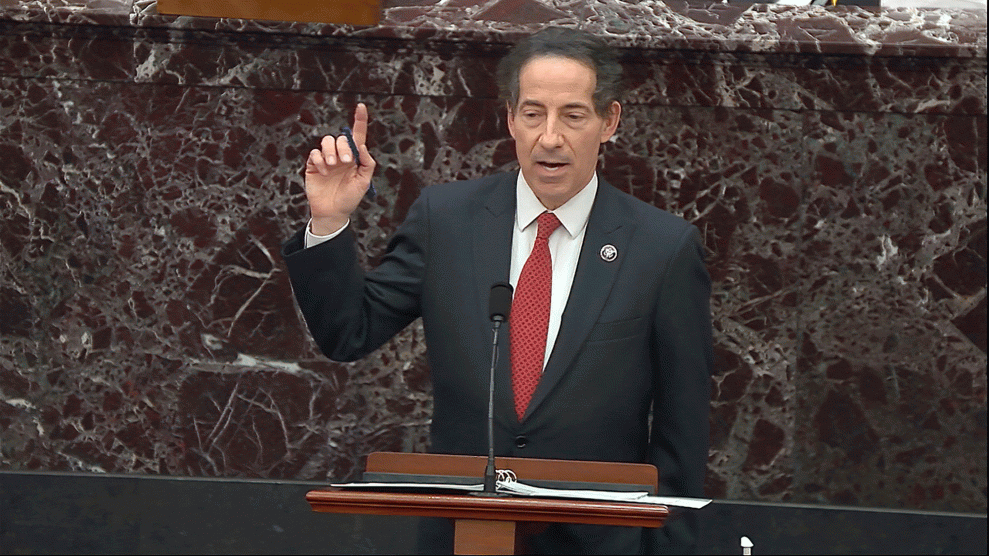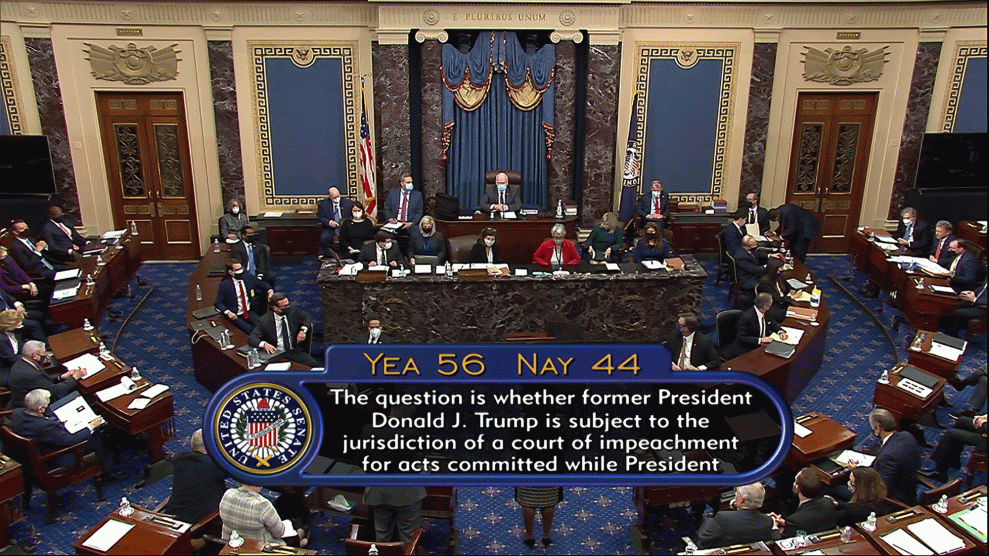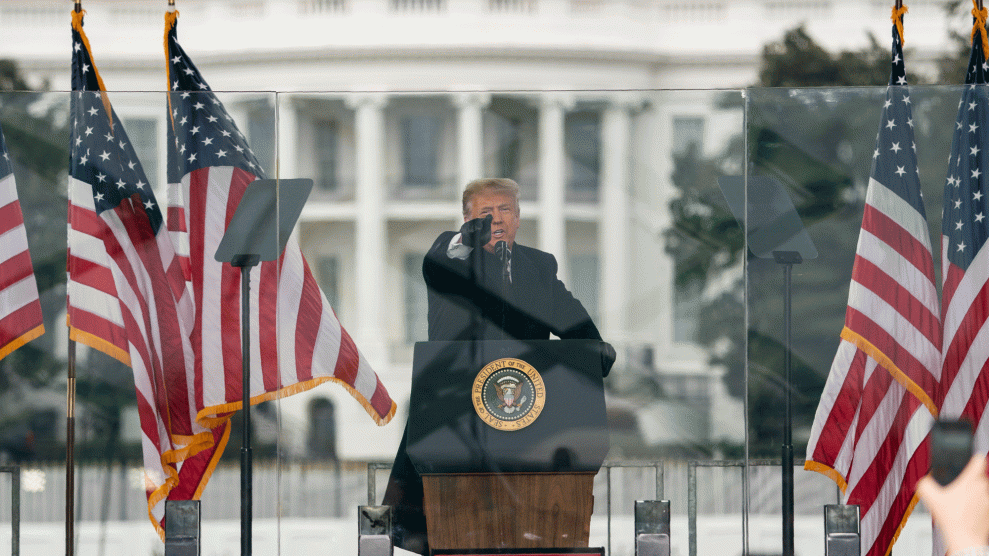
AP
During his opening presentation for the second impeachment trial of Donald Trump, Rep. Jamie Raskin (D-Md.), the lead House impeachment manager, dubbed the former president the “inciter-in-chief.” That came across as a clever phrase, and it certainly fit the known and basic facts: For two months, Trump inflamed his supporters with conspiracy theories and lies claiming the election had been robbed from him by a nefarious cabal; he called his followers to Washington, DC, on January 6 for a “wild” day; and that day he delivered a fiery speech to a crowd full of white supremacists, neo-Nazis, QAnon-ers, and Christian insurrectionists, urging them to head to the Capitol and “fight like hell” to “stop the steal.” But as Raskin and his team have detailed all of this—showing graphic and disturbing video of the murderous attack on Congress—they have also presented chilling evidence that makes the case that Trump directly incited the seditious marauders even stronger. That is, the story is worse than was already known.
A shocking instance of this involves Mike Pence. As part of the presentation on Wednesday, impeachment manager Rep. Joaquin Castro (D-Texas) laid out the chronology related to a tweet Trump sent during the riot. Throughout the day, Trump had pressured Vice President Pence to block the electoral vote count that was to take place in Congress—a move that would be unconstitutional and that Pence had no authority to take. At the pre-attack rally near the White House, Trump declared before the riled-up crowd, “Mike Pence, I hope you’re gonna stand up for the good of our Constitution and for the good of our country. And if you’re not, I’m going to be very disappointed in you.” He added, “I’m not hearing good stories.” He was setting Pence up to be a fall guy—and a target.
As Trump was speaking, Pence released a statement saying he did not possess the power to block the congressional certification of the vote. “Four years ago, surrounded by my family, I took an oath to support and defend the Constitution, which ended with the words, ‘So help me God.’ Today I want to assure the American people that I will keep the oath I made to them and I will keep the oath I made to Almighty God.” Pence, in this instance, would not serve Trump over God. With these words, Pence became an enemy of Trump’s mob, many of whom were at this time heading to the Capitol, where Pence was presiding over the certification ceremony.
As Trump’s terrorists assaulted police officers and ran amok through the halls of Congress, some directed their rage at Pence and were searching for him. Some chanted, “Hang Pence!” On the grounds of the Capitol, others built a gallows. As Castro noted, at 2:24 p.m. ET, about 30 minutes into the mayhem, Trump zapped out a tweet. It did not condemn the rioters. (Trump would not do so at any time on January 6.) The tweet did not ask his followers to end the violence and withdraw. Instead, Trump blasted his own vice president: “Mike Pence didn’t have the courage to do what should have been done to protect our Country and out Constitution…USA demands the truth!”
At this point, Trump was certainly aware of the mayhem being caused by his supporters in the citadel of American democracy. Minutes earlier, Pence and his family had been evacuated from the House floor for their safety. And there is good indication that Trump had been informed of this prior to his tweet. Yet with violent extremists roaming the Capitol and on the hunt for Pence (and House Speaker Nancy Pelosi), Trump further fueled their rage and placed Pence in even greater danger. Castro played video showing a Trump rioter using a bullhorn to read Trump’s tweet condemning Pence to the crowd on Capitol Hill. The message was clear: Pence was a traitor. As the riot was intensifying, Trump had explicitly directed its wrath against Pence. This is incitement.
During her presentation, impeachment manager Del. Stacey Plaskett (D-Virgin Islands) noted another way in which Trump encouraged the violence that happened at the Capitol. In October, a pickup truck caravan of Trump supporters surrounded a Biden campaign bus on a Texas highway and nearly drove it off the road. Afterward, as Plaskett noted, Trump tweeted: “These patriots did nothing wrong.” Keith Lee, the Trump loyalist who was one of the organizers of that caravan, she said, was at the Capitol on January 6. He reportedly had cased entrances to the Capitol that morning, and when the mob arrived he used a bullhorn to encourage rioters to break into the building. Two months earlier, Trump had given his blessing to Lee and his extremist methods.
Plaskett also pointed out that Trump’s political operation routinely monitored the activity of Trump supporters—including extremists—on social media and chat sites, and it would have been aware of the references to possible violent action on January 6 that had appeared in these quarters. Consequently, Trump and his team knew that he would be playing with fire when he called on the assembled to march on Congress and fight for him.
Trump’s unimpressive attorneys are expected to argue that he had no direct role in driving his supporters to attack the Capitol. Fight like hell? That’s common politics-speak. He didn’t mean it literally, not “fight” as in physically assault police officers, ransack Congress, and pursue elected officials for possible assassination. But the impeachment managers have served up a compelling case that Trump encouraged the violence and once it was underway did nothing to stop it, and, in fact, he purposefully made the situation worse and further jeopardized the life of his vice president. (Trump later in the day told the rioters, “We love you. You’re very special.”) Of course, there is a load of evidence showing that Trump’s brownshirts believed they were there on Trump’s behalf and at his urging. And when a mob of extremists say they were incited, perhaps they should be believed. But that aside, the impeachment managers have demonstrated that Trump’s culpability for the brutal and bloody domestic terrorism committed by his loyalists in his name is immense and beyond question.
















